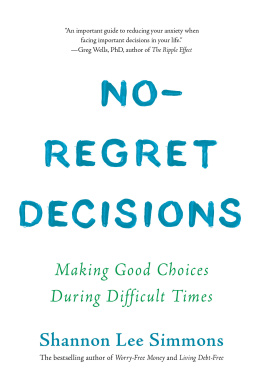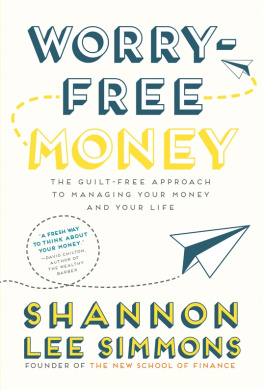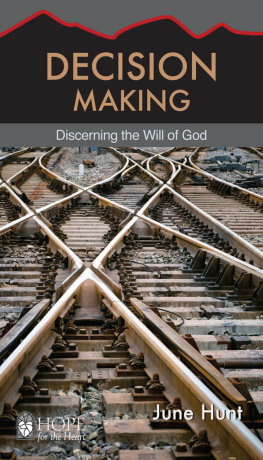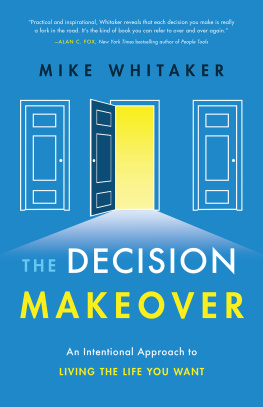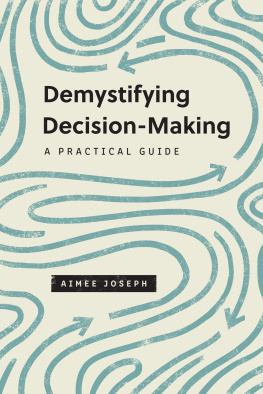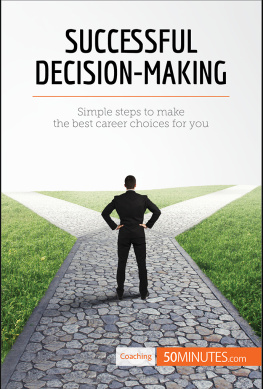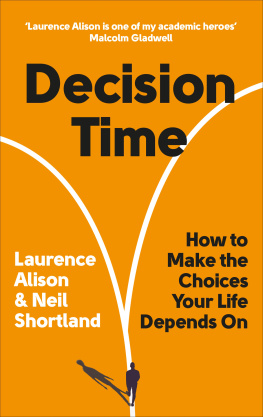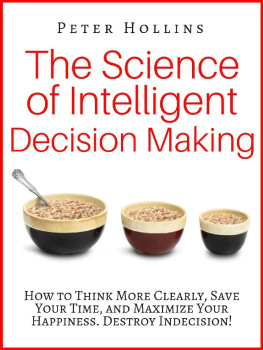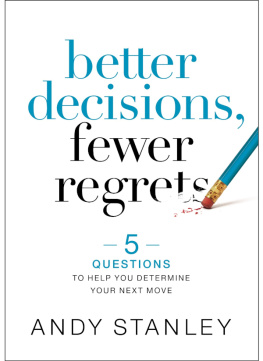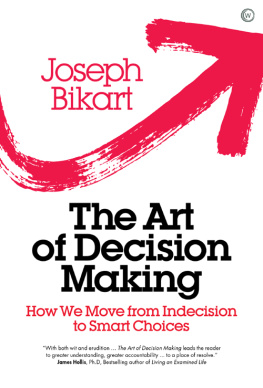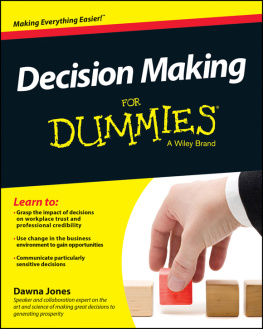The stories in this book are real. The people are my clients, each of whom had to make life-altering decisions during a difficult time in their life: divorce, retirement, or midlife crisis, while becoming a caregiver, or while dealing with fertility or job loss.
The conversations had and the emotions expressed are realI didnt sugar-coat them. Each person in this book has given me express permission to tell their story, although their names and any identifying factors have been changed for privacy.
Its also important to note that all advice given in this book assumes that a persons basic needs for food, shelter, and personal freedoms are being met and that their personal safety is intact.
If youre reading this book, you probably need to make some really difficult decisions during a really difficult time. Youve found yourself in what I call a decision crisis and are likely experiencing a ton of uncertainty about the future. Unfortunately, there is no turning back. The emotional and financial stakes are high, but you have to make big decisions whether you like it or not.
Youre facing a lot. So take a deep breath. Youre in the right place. I can help.
Im a certified financial planner, life coach, and collaborative divorce professional who has been on the front lines of financial planning and life coaching for over 15 years. My job is to help people navigate complex decisions during major transitions in their lives. Divorce, critical illness, buying your first house, becoming a caregiver, family planning, infertility, death of loved ones, job losses, retirement... You know, life.
I often joke that my job is 90% life coaching and 10% financial spreadsheets, which is what I love most about my work and this book. My previous two books were financial planning advice with a side of coaching. This one is different. Its a life-coaching book with a side of financial planning: 90% life coaching and 10% spreadsheet.
This book is for people whose lives have been, or are about to be, turned upside down, forcing them into a situation where they need, or want, to make big, potentially life-altering decisions. Decisions with high emotional and financial stakes, made without knowing what their next normal will look likewhat their daily life will be after making these huge upcoming decisions.
This book will teach you how to make difficult decisions today, tomorrow, and 10 years from now. Decisions you can look back on and say, I wouldnt have done it any other way, no matter how things ended up playing out.
I call these no-regret decisionsthe kinds of decisions that give you hope for the future and restore your confidence in your ability to handle anything that life throws your way.
If youre experiencing a major life transition, uncertainty about your future can be terrifying, and youre likely in panic mode a lot of the time. If theres one thing I know after helping people navigate complex choices, its that your outlook today will dictate the decisions you make and that those decisions can impact the next version of your daily life. You are creating your next normal, one decision at a time.
That may feel like a lot of pressure, but its also awesome! Even though you may be having a rough time right now and dont want to make the decisions that lie in front of you, its comforting to know that maybe, just maybe, you have a smidgen of control over the outcome. To me, thats a relief.
Ive been through my own personal crises and major life transitions, too. I moved out West for love and realized the moment my plane landed that I was so wrong and should have never come. I was heartbroken, living on the other side of the country without friends or family, and I had to decide if I should stay or go home. Oof.
Then came the time when I wanted to quit my high-rollin Bay Street job to start my own business but was scared to leave the golden handcuffs behind. I had to decide whether to quit or stay. I decided to follow my dream, but it didnt work out right away and I couldnt afford my new life. Defeated, I had to empty out my savings, take on credit card debt, and then decide if I should keep going or give up. Eek!
Most recently, I faced the challenge of parenting my children while juggling work-from-home during the COVID-19 pandemic and ensuing lockdowns that turned the world upside down starting in March 2020. Ugh.
During the first weeks of lockdown, I was exhausted and frazzled. Faced with the unknown, my adrenalin levels skyrocketed on a daily basis. Both my husband and I were fortunate to have full-time jobs that allowed us to work from home, but with childcare having been abruptly closed, we were also trying to take care of a 6-month-old baby and a 2 -year-old toddler. Every day was a sprint. Total chaos.
I knew I was lucky: We were all healthy. My husband, Matt, and I didnt work on the front lines. I had nothing to complain about and so much to be grateful for. But I still felt scared and frenzied and guilty all the time.
I had over 200 (remote) meetings during the first lockdown. It was tax season, so my schedule was packed with back-to-back tax meetings and emergency financial planning sessions. I was painfully aware of how many of my clients had been laid off and were struggling to secure financial support. They were all counting on me to be there for them, to help them navigate everything financial. On top of that, I felt the weight of being there for my team at work while also being a strong emotional support for my kids. Most days I barely made it through a client session, team call, or media interview without bursting into tears as soon as I hung up.
Sometimes, I didnt make it.
The day the Canadian Emergency Response Benefit (CERB) was announced, I locked myself in our bathroom so I could do an interview (my seventh of the day) in the shower stall, where Id hoped the interviewer couldnt hear my crying toddler on the other side of the door.
She could hear him. She asked me if I was okay. (What is it about that question?) I shut my eyes tightly and, even though I knew she couldnt see me, shook my head without saying a word. I couldnt answer without crying. We stayed on the phone, silently, listening to the sound of my toddler wailing for me while Matt tried to calm him down. Then she broke the silence with a simple I know. Its impossible.
Later on, at the end of that particularly tough workday, I went into the kitchen to make dinner. The radio was playing in the background and, in what seemed to be a cruel twist of fate, I could hear a parenting expert being interviewed. The host of the show asked, So how do we parent positively during a pandemic?
The guest didnt miss a beat, responding that this was our new normal and that we all just needed to focus on the good things we still had in our lives. According to the expert, appreciation was the antidote to fear.
I remember glaring at the radio and shouting in my head, Stop talking! This isnt normal and none of this is okay!
My husbands workday ended, and I heard him dashing up the basement stairs to help with the kids and dinner, as always. Matt came into the kitchen to find me crying over a pot of macaroni, trying to hide the tears from my kids.
Whats wrong?
Nothing, I blubbered. Everything.
I know, he said.
What if we cant beat it? I asked, my eyes wide and full of tears. What if this is it? What if things never go back to normal?
I was in crisis and trying so hard not to be.
He hugged me tightly. It will. This isnt forever. Its going to be okay.
Mommy? my toddler said softly from the kitchen door. I quickly wiped my eyes before turning around with a big smile.

